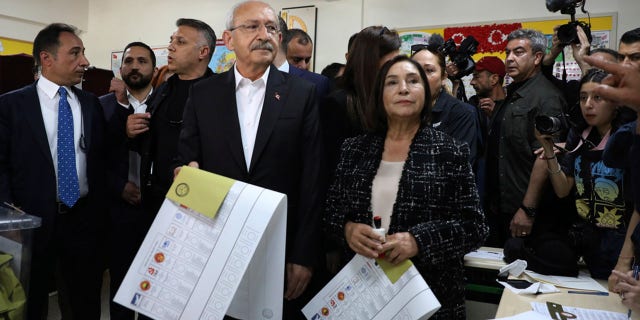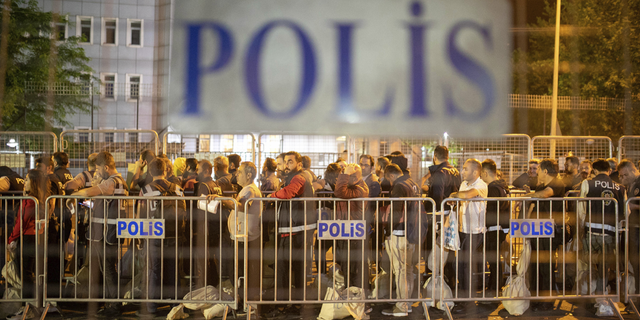Turkey election: President Erdogan, challenger are headed to May 28 runoff
Erdogan has been either prime minister or president of Turkey for two decades
The closely watched presidential election in Turkey will be decided by a runoff vote on May 28, after President Recep Tayyip Erdogan and his main challenger, opposition leader Kemal Kilicdaroglu, each failed to capture an outright victory.
Preliminary results showed Erdogan won 49.5% of the vote, while Kilicdaroglu grabbed 44.9%, and the third candidate, Sinan Ogan, received 5.2%, according to Ahmet Yener, head of the Supreme Electoral Board.
Yener told the Associated Press that the 69-year-old Erdogan – who has served as either prime minister or president of Turkey continuously since 2003 – would not be able to get enough votes for a win even if all the remaining uncounted ones went in his favor.
 "That the election results have not been finalized doesn’t change the fact that the nation has chosen us," Erdogan told his supporters on Monday.
"That the election results have not been finalized doesn’t change the fact that the nation has chosen us," Erdogan told his supporters on Monday.
Turkey's President Recep Tayyip Erdogan with supporters at a polling station, in Istanbul, Turkey, on Sunday, May 14. (DHA via AP)
"Don’t lose hope.... We will get up and win this election together," tweeted Kilicdaroglu, 74, who ran as the candidate of a six-party opposition alliance.
In the last presidential election in 2018, Erdogan won in the first round, with more than 52% of the vote.
Complicating the picture further, both sides have accused state-run Anadolu News Agency of manipulating the figures. Members of Kilicdaroglu's center-left, pro-secular Republican People's Party, or CHP, have contended that the state-run agency was biased in Erodgan's favor.
"We are ahead," tweeted Kilicdaroglu at one point.
SERBS MARCH ON BELGRADE IN DROVES AFTER BACK-TO-BACK MASS SHOOTINGS
Meanwhile, Erdogan's Justice and Development Party, has accused the opposition of "an attempt to assassinate the national will" by claiming the state news agency was distorting the results. He called the opposition claims "irresponsible."


Kemal Kilicdaroglu, the 74-year-old leader of the center-left, pro-secular Republican People's Party, or CHP, and presidential candidate of Turkey's main opposition alliance, and his wife Selvi Kilicdaroglu, vote at a polling station in Ankara, Turkey, on Sunday, May 14. (AP Photo/Ali Unal)
The presidential race has centered on domestic issues such as the economy, civil rights and a February earthquake that killed more than 50,000 people. Erdogan’s administration has faced sharp criticism over its handling of the earthquake, exacerbated by a lax implementation of building codes.
While Erdogan hoped to win a five-year term that would take him well into his third decade as Turkey's leader, Kilicdaroglu campaigned on a promise to return the country to a more democratic path and to repair its economy, battered by high inflation and currency devaluation.

Polling station officials wait with bags containing ballots outside the Supreme Electoral Board office in Diyarbakir, Turkey, on Monday, May 15.
More than 64 million people, including 3.4 million overseas voters, were eligible to vote. This year marks 100 years since Turkey's establishment as a republic — a modern, secular state born on the ashes of the Ottoman Empire.
Kilicdaroglu's Nation Alliance pledged to return Turkey's governance system to a parliamentary democracy if it won both the presidential and parliamentary ballots. It also promised to restore the independence of the judiciary and the central bank, and to reverse crackdowns on free speech and other forms of democratic backsliding in Turkey.
No comments: